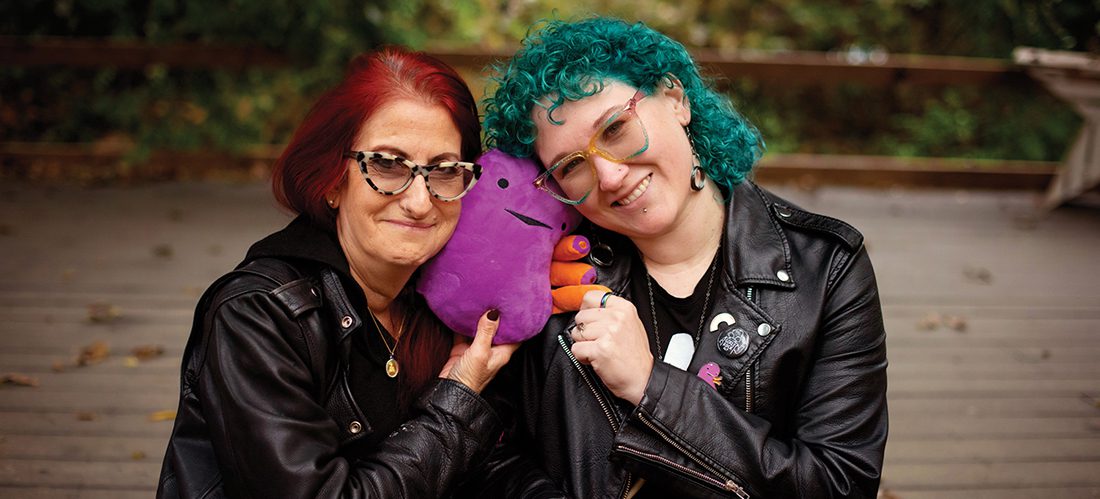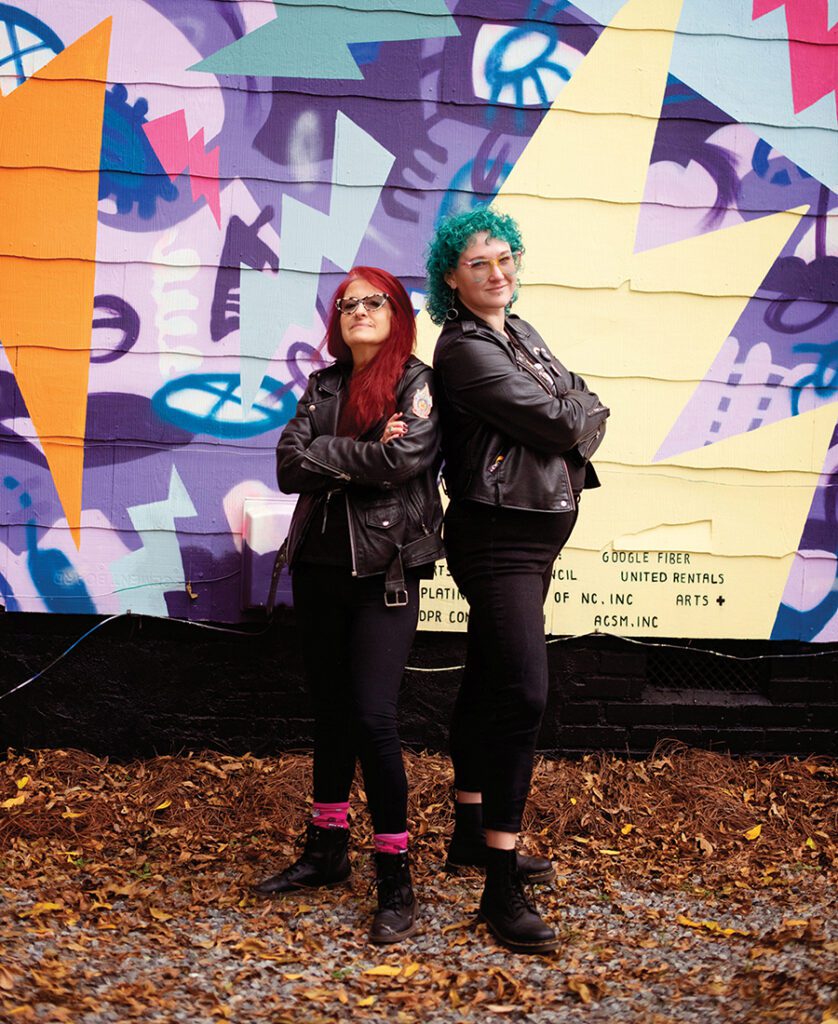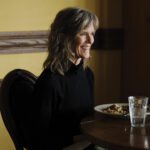An angel across the street
January 31, 2024

A new kidney may have saved artist and NoDa co-founder Ruth Ava Lyons’ life. Her donor, Krystle Baller, says Lyons did the same for her.
by Page Leggett
“Ruth rolled up to Smelly Cat like a bada** — on a motorcycle, wearing a leather jacket,” recalls Krystle Baller of her first encounter with Ruth Ava Lyons. “She took her helmet off and had this amazing, flowing, red hair. And I’m like: Who is this mystical unicorn?”
It was 2016 or thereabouts when Baller, a musician with a studio in NoDa, met the artist who, along with her husband, Paul Sires, are the de facto founders of NoDa, home to Smelly Cat Coffeehouse and other bars, restaurants, tattoo shops and music venues.
Baller (who uses they/she pronouns) is creative director at We Rock Charlotte (formerly Girls Rock Charlotte), an organization that provides youth music camps and lessons. They were planning a workshop and had enlisted Lyons to teach the young musicians how to hula hoop.
Lyons, 67, is a Renaissance woman (and mystical unicorn) who paints, scuba dives and seeks adventure all over the globe. She hula hoops (often with hoops set ablaze!) and zips around town on her motorcycle, a Suzuki Savage. But living that large was partly a coping mechanism.
Since 2010, Lyons has known she has the same hereditary disease that took her mother, Sally, and sister, Nadine. Polycystic kidney disease (PKD) causes fluid-filled cysts to form and expand in both kidneys, eventually leading to kidney failure. At that point, the only options are dialysis and/or a transplant.
Nadine’s illness prompted her then-asymptomatic sister to see a nephrologist 15 years ago. Lyons was warned she needed to de-stress or risk “ending up on a machine.” The news led to Lyons and Sires closing Center of the Earth, the fine art gallery they’d run for 22 years, and the seed that started NoDa.
Last year, Lyons found herself in the position she’d long sought to avoid — and avoid discussing. She’d never seen a reason to talk about PKD, since she’d convinced herself she was too healthy and active to get sick.
But after her kidneys began to fail, and after her husband and son were ruled out as donors, she revealed on Facebook that finding a kidney had become imperative. “My kids (Orion Sires of Charlotte and Eden Sires of Manhattan Beach, Calif.) thought it would help me find a donor,” she says. Finding a match isn’t easy. Her sister died waiting for one.
It’s not that Lyons didn’t understand the gravity of her disease. Early-stage PKD is easy to ignore when there are few, if any, symptoms. As it progresses, high blood pressure, urinary tract infections and kidney stones become common. Lyons had them all.
On bad days, she had unrelenting muscle cramps, nausea, fatigue. Doctors told her to stay healthy to prepare for the transplant she hoped for, but fatigue made that hard. She gave up her membership at the JCC near her south Charlotte home, quit doing yoga and cut back on roller skating, hooping and cycling.

Ruth Ava Lyons, left, and her kidney donor, Krystle Baller, right
The search is on
Someone with PKD has a 50% chance of passing it on to their children. Lyons begged her kids to get tested, and Orion learned he may have it, though tests so far are inconclusive. “I wouldn’t have taken an organ from my own child,” she says. “But I wanted them to know if they’ve got this thing. Orion was devastated … that he couldn’t be my donor. He was planning to donate anonymously.”
With coaxing from her family, Lyons went public. “I want to hang out some more with my inspiring grown kids and my sweet granddaughter,” she wrote on Facebook, “and continue to make contributions with art, community and the world.” (That granddaughter is Aspen, Orion’s 2-year-old.)
Once testing confirmed Lyons was healthy enough for a transplant, she got on waiting lists for living and deceased donors. But she preferred a living donor because they’re more carefully vetted.
Lyons has connections all over the world. She’s been to the Arctic, the Amazon, Indonesia’s Raja Ampat Islands and Nevada’s Black Rock Desert (for Burning Man). Her life-saving kidney could’ve come from anywhere.
Help was here all along
But Lyons’ match turned out to be someone she knew — someone literally across the street.
We Rock Charlotte is across from Starlight on 22nd, the NoDa-adjacent bar/open mic/poetry lounge Lyons, Sires and Orion opened in 2021. Lyons was amazed that her donor was, as she put it, “right in my own backyard — just like in The Wizard of Oz.”
After seeing Lyons’ Facebook post, Baller and their wife, artist Elizabeth Palmisano, decided they’d both apply to be her donor. But the ibuprofen Palmisano takes regularly for back pain eliminated her.
Baller, 38, kept passing every test — kidney function tests, a mental health evaluation, blood tests. Their blood type, O negative, makes them a universal donor. All the testing, the surgery, the hospital stay, cost Baller nothing. Lyons’ insurance covered it all.
They were happy to be healthy enough to donate. A year ago, their BMI might’ve disqualified them. But they started walking — and later hiking — for their mental health. And lost weight in the process. Then, they quit smoking. They’re also pescatarian and watch their sodium intake.
Almost inadvertently, they’d become the idealdonor.
Baller was assigned a donor advocate — a surgeon who’s performed kidney transplants — who helped prepare them. “I asked a bunch of questions, including, ‘Does anybody ever regret donating a kidney?’ And he said the entire time he’s been doing this — over 20 years — he’s never talked to anyone who regrets it. And that’s true even if the operation wasn’t a success.”
The evaluation process was emotionally fraught for Baller. They’d get a call with news they hadn’t passed a test. Then, they’d hear it was a false negative.
But they remained determined. “I told Ruth and Paul in June, ‘Look, I’m doing this.’ They said I could change my mind any time. They kept reiterating that, but I kept saying, ‘I’m stubborn.’”
‘So many angels’
In the months leading up to the November transplant, Lyons wasn’t worried about whether or not the transplant would be successful. Her doctors were optimistic and hadn’t given her any cause for concern. Still, she updated her living will and organized her jewelry for daughter Eden. “I wanted to be ready for anything,” she says.
While Baller’s 10-year-old daughter, Cadence, was nervous about her mom’s surgery, she ultimately said she’s proud of her mom for sharing a part of herself with a friend who desperately needed it.
Baller didn’t have time to be nervous. In June, they learned they had to vacate the rental house they loved. The family moved to another rental, a Dilworth duplex, in July. In September, they found their dream house, bought it and moved in. That was two weeks before surgery, but friends helped paint and get the family settled.
Friends helped keep Lyons’ spirits buoyed during her wait for a match. “There’ve been so many angels,” she says. “The people who’ve shown up for me blow my mind. It’s really beautiful to see how many people care.”
‘Happy tears’
On transplant day, Lyons and Baller chatted in the surgical prep area of Atrium’s main hospital. Each was behind privacy curtains, but they gabbed as they waited to be wheeled into the OR. Baller told Lyons about the last time she was in a hospital; it had been a decade since Cadence’s birth.
Two surgeons were involved — one to laparoscopically remove Baller’s healthy kidney and another to transplant it into Lyons’ abdomen. The donor goes into surgery first; the recipient goes about an hour later.
“The first thing I asked the nurse when I woke up was: ‘Is Ruth OK?’” Baller says. “She was still in surgery. The next time I woke up, I asked again. This time, the nurse said, ‘It worked!’… I started crying, and the nurse thought it was from pain. I told her they were happy tears.”
There was pain, but it was tolerable. “I’m a woman,” Baller says. “I may use they pronouns, but I’m a woman and can therefore handle pain.”
The day after the transplant, Lyons walked to Baller’s hospital room. “When I saw her, I think I said, ‘D*mmit, you beat me,’” Baller says. “I had hoped to walk to her room first.”
Both donor and recipient were discharged Nov. 22 with instructions to take it easy for eight weeks. Lyons, now off dialysis, was thrilled to send the equipment back.
She doesn’t think of her new kidney, which she’s named “K” for Krystle, as hers. “I’ve heard of recipients who go back to old, unhealthy habits,” she says. “I’m honoring Krystle’s sacrifice by taking care of [their] kidney.”
Lyons didn’t ask for anything for herself after surgery but told friends who wanted to help that they could send a meal to Baller’s family.
They’re like one family now. A part of one now lives inside the other. “Ruth and I are kindred spirits, for sure,” Baller says.
Giving away a part of her has been beneficial for her health, she adds. “Donating my kidney is a great motivator for me to continue living a healthy lifestyle. That means less processed foods, more walks in the woods and lots of water. Ruth is saving my life, too.” SP
photographs by Lora Denton
This story was updated on Feb. 12.


